Impact of Class and Gender on Educational Experiences since 1918
VerifiedAdded on 2022/12/15
|10
|3180
|452
AI Summary
This essay discusses the impact of class and gender on educational experiences since 1918 and how it has changed over time. It explores the inequalities in education due to social class and gender, and the policies implemented to address these issues. The essay highlights the importance of providing equal opportunities to all students, regardless of their class or gender, for a better educational experience.
Contribute Materials
Your contribution can guide someone’s learning journey. Share your
documents today.
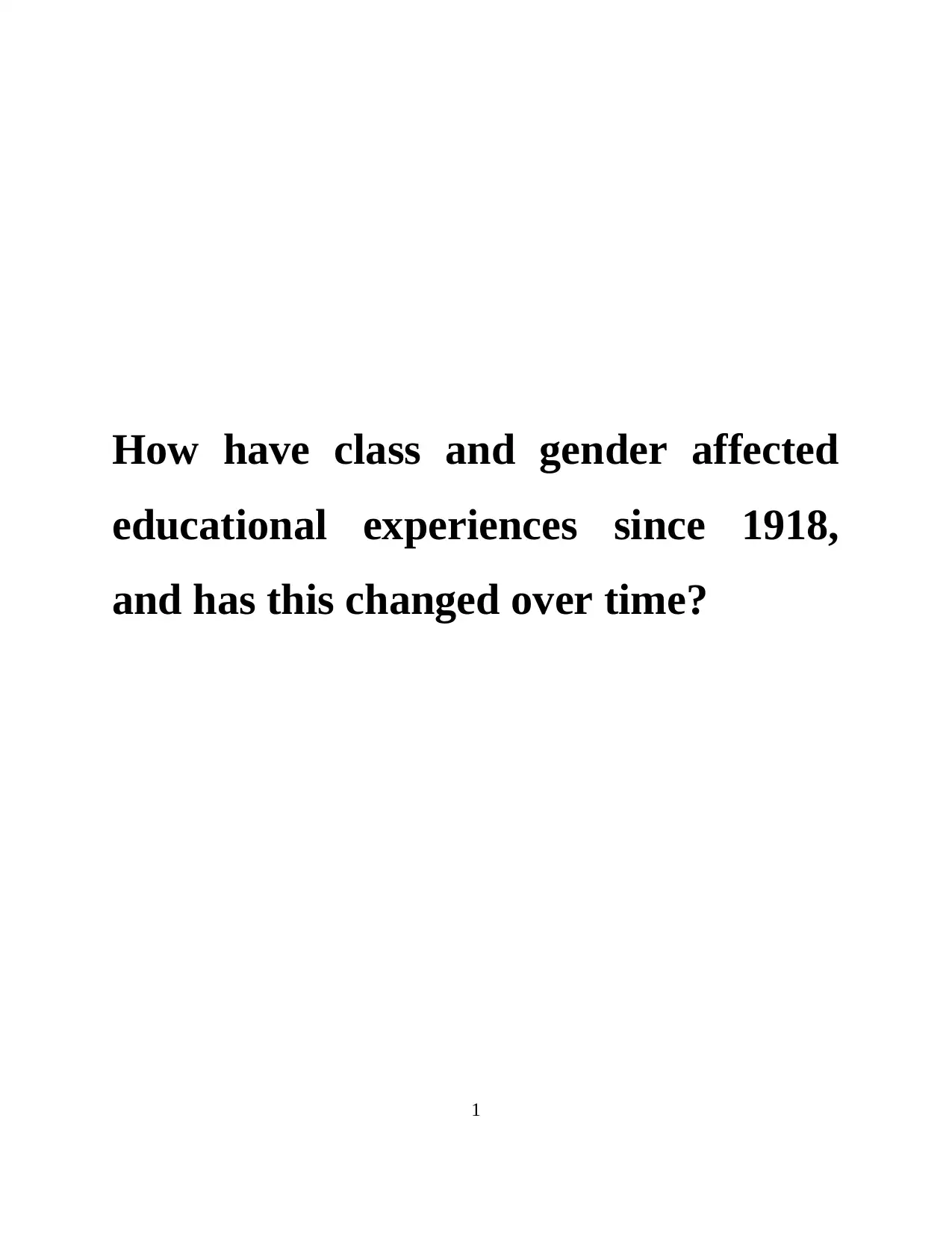
How have class and gender affected
educational experiences since 1918,
and has this changed over time?
1
educational experiences since 1918,
and has this changed over time?
1
Secure Best Marks with AI Grader
Need help grading? Try our AI Grader for instant feedback on your assignments.
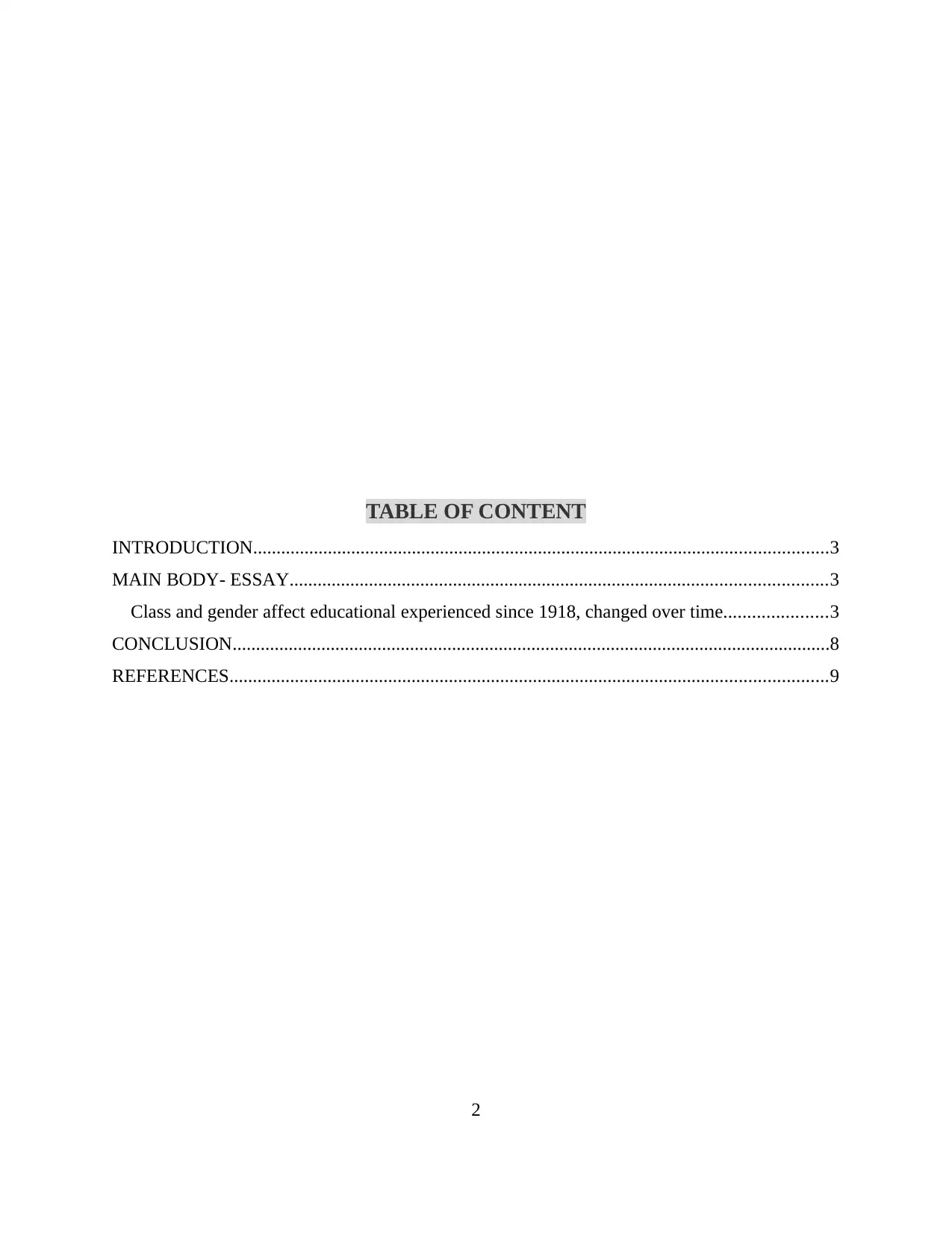
TABLE OF CONTENT
INTRODUCTION...........................................................................................................................3
MAIN BODY- ESSAY...................................................................................................................3
Class and gender affect educational experienced since 1918, changed over time......................3
CONCLUSION................................................................................................................................8
REFERENCES................................................................................................................................9
2
INTRODUCTION...........................................................................................................................3
MAIN BODY- ESSAY...................................................................................................................3
Class and gender affect educational experienced since 1918, changed over time......................3
CONCLUSION................................................................................................................................8
REFERENCES................................................................................................................................9
2
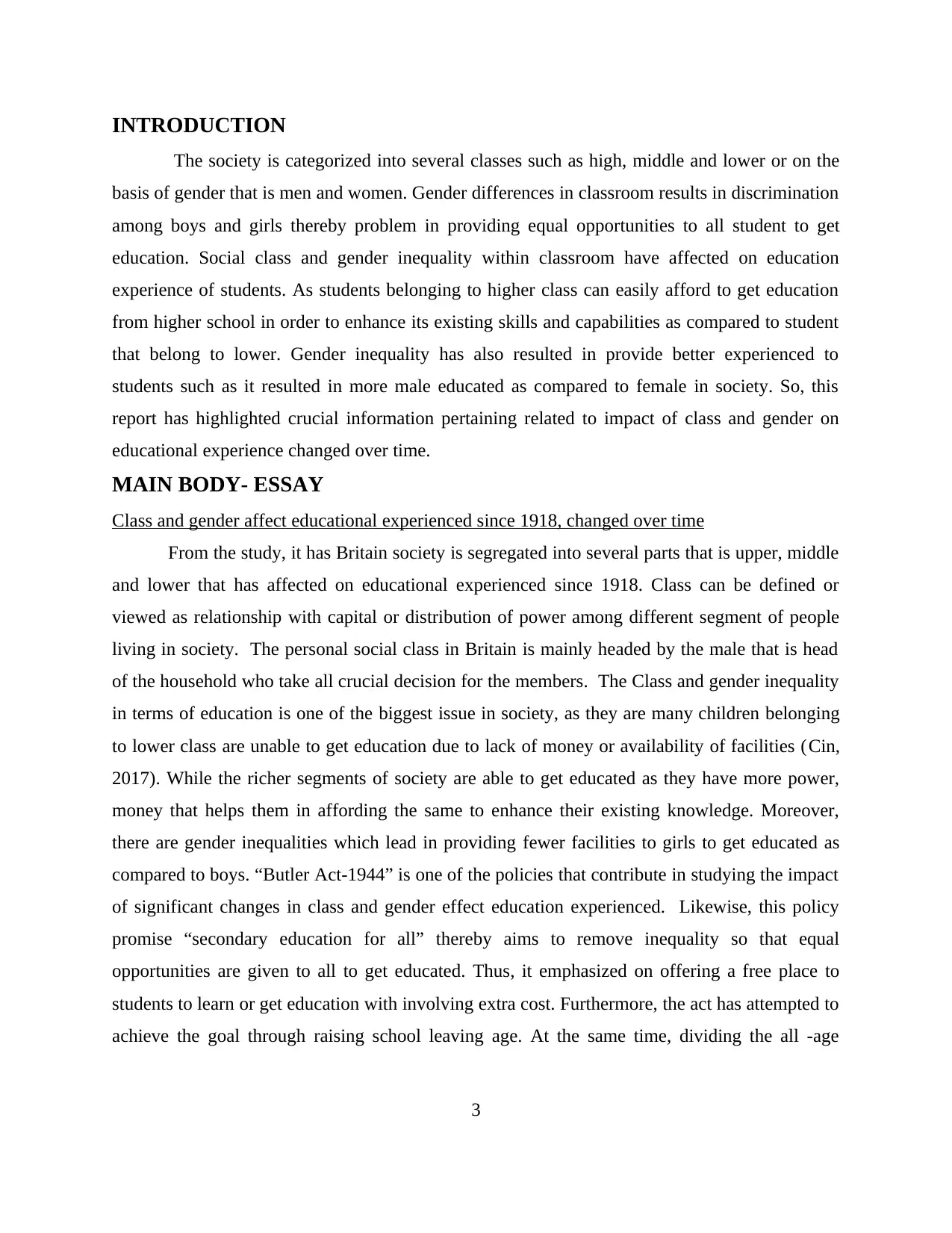
INTRODUCTION
The society is categorized into several classes such as high, middle and lower or on the
basis of gender that is men and women. Gender differences in classroom results in discrimination
among boys and girls thereby problem in providing equal opportunities to all student to get
education. Social class and gender inequality within classroom have affected on education
experience of students. As students belonging to higher class can easily afford to get education
from higher school in order to enhance its existing skills and capabilities as compared to student
that belong to lower. Gender inequality has also resulted in provide better experienced to
students such as it resulted in more male educated as compared to female in society. So, this
report has highlighted crucial information pertaining related to impact of class and gender on
educational experience changed over time.
MAIN BODY- ESSAY
Class and gender affect educational experienced since 1918, changed over time
From the study, it has Britain society is segregated into several parts that is upper, middle
and lower that has affected on educational experienced since 1918. Class can be defined or
viewed as relationship with capital or distribution of power among different segment of people
living in society. The personal social class in Britain is mainly headed by the male that is head
of the household who take all crucial decision for the members. The Class and gender inequality
in terms of education is one of the biggest issue in society, as they are many children belonging
to lower class are unable to get education due to lack of money or availability of facilities (Cin,
2017). While the richer segments of society are able to get educated as they have more power,
money that helps them in affording the same to enhance their existing knowledge. Moreover,
there are gender inequalities which lead in providing fewer facilities to girls to get educated as
compared to boys. “Butler Act-1944” is one of the policies that contribute in studying the impact
of significant changes in class and gender effect education experienced. Likewise, this policy
promise “secondary education for all” thereby aims to remove inequality so that equal
opportunities are given to all to get educated. Thus, it emphasized on offering a free place to
students to learn or get education with involving extra cost. Furthermore, the act has attempted to
achieve the goal through raising school leaving age. At the same time, dividing the all -age
3
The society is categorized into several classes such as high, middle and lower or on the
basis of gender that is men and women. Gender differences in classroom results in discrimination
among boys and girls thereby problem in providing equal opportunities to all student to get
education. Social class and gender inequality within classroom have affected on education
experience of students. As students belonging to higher class can easily afford to get education
from higher school in order to enhance its existing skills and capabilities as compared to student
that belong to lower. Gender inequality has also resulted in provide better experienced to
students such as it resulted in more male educated as compared to female in society. So, this
report has highlighted crucial information pertaining related to impact of class and gender on
educational experience changed over time.
MAIN BODY- ESSAY
Class and gender affect educational experienced since 1918, changed over time
From the study, it has Britain society is segregated into several parts that is upper, middle
and lower that has affected on educational experienced since 1918. Class can be defined or
viewed as relationship with capital or distribution of power among different segment of people
living in society. The personal social class in Britain is mainly headed by the male that is head
of the household who take all crucial decision for the members. The Class and gender inequality
in terms of education is one of the biggest issue in society, as they are many children belonging
to lower class are unable to get education due to lack of money or availability of facilities (Cin,
2017). While the richer segments of society are able to get educated as they have more power,
money that helps them in affording the same to enhance their existing knowledge. Moreover,
there are gender inequalities which lead in providing fewer facilities to girls to get educated as
compared to boys. “Butler Act-1944” is one of the policies that contribute in studying the impact
of significant changes in class and gender effect education experienced. Likewise, this policy
promise “secondary education for all” thereby aims to remove inequality so that equal
opportunities are given to all to get educated. Thus, it emphasized on offering a free place to
students to learn or get education with involving extra cost. Furthermore, the act has attempted to
achieve the goal through raising school leaving age. At the same time, dividing the all -age
3
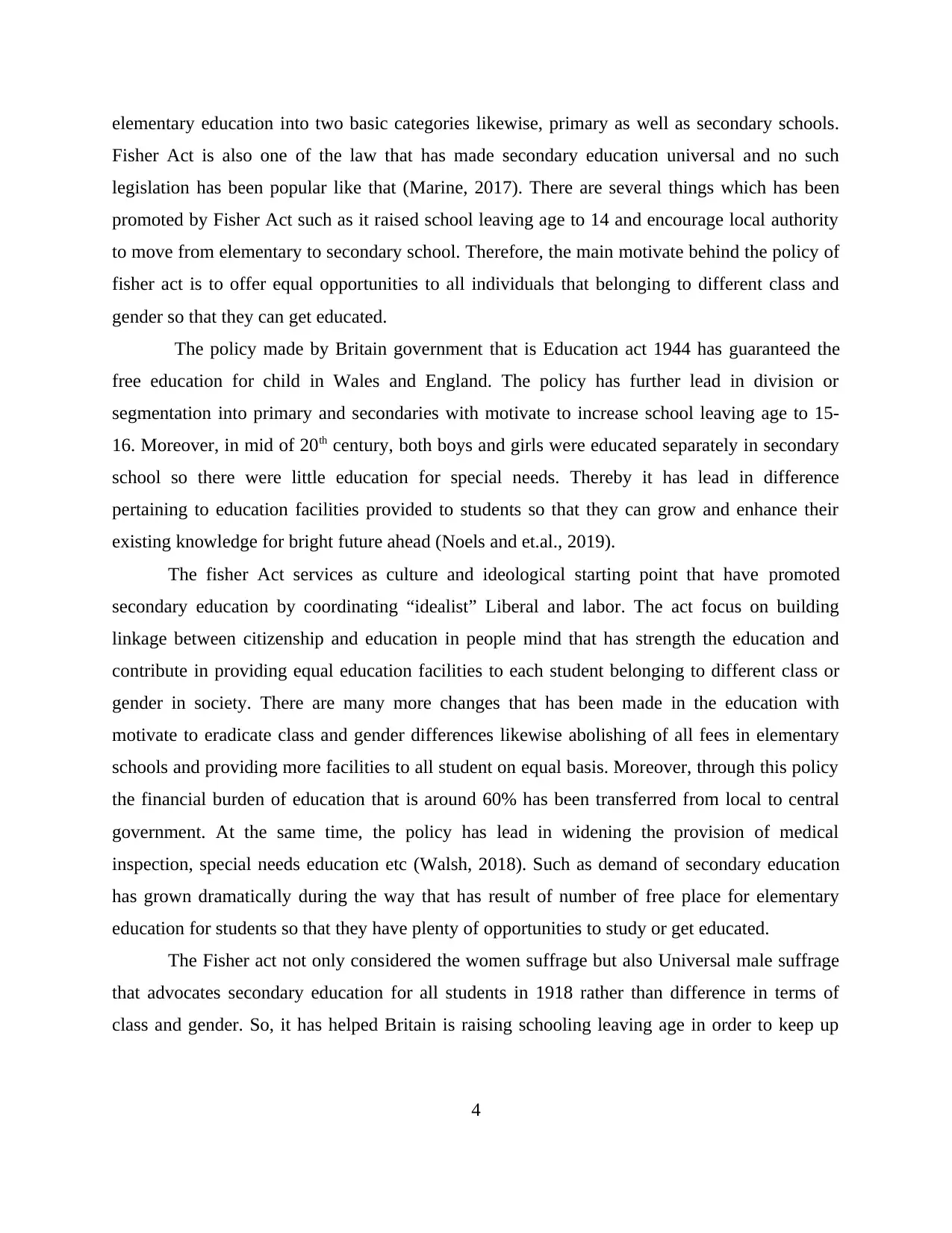
elementary education into two basic categories likewise, primary as well as secondary schools.
Fisher Act is also one of the law that has made secondary education universal and no such
legislation has been popular like that (Marine, 2017). There are several things which has been
promoted by Fisher Act such as it raised school leaving age to 14 and encourage local authority
to move from elementary to secondary school. Therefore, the main motivate behind the policy of
fisher act is to offer equal opportunities to all individuals that belonging to different class and
gender so that they can get educated.
The policy made by Britain government that is Education act 1944 has guaranteed the
free education for child in Wales and England. The policy has further lead in division or
segmentation into primary and secondaries with motivate to increase school leaving age to 15-
16. Moreover, in mid of 20th century, both boys and girls were educated separately in secondary
school so there were little education for special needs. Thereby it has lead in difference
pertaining to education facilities provided to students so that they can grow and enhance their
existing knowledge for bright future ahead (Noels and et.al., 2019).
The fisher Act services as culture and ideological starting point that have promoted
secondary education by coordinating “idealist” Liberal and labor. The act focus on building
linkage between citizenship and education in people mind that has strength the education and
contribute in providing equal education facilities to each student belonging to different class or
gender in society. There are many more changes that has been made in the education with
motivate to eradicate class and gender differences likewise abolishing of all fees in elementary
schools and providing more facilities to all student on equal basis. Moreover, through this policy
the financial burden of education that is around 60% has been transferred from local to central
government. At the same time, the policy has lead in widening the provision of medical
inspection, special needs education etc (Walsh, 2018). Such as demand of secondary education
has grown dramatically during the way that has result of number of free place for elementary
education for students so that they have plenty of opportunities to study or get educated.
The Fisher act not only considered the women suffrage but also Universal male suffrage
that advocates secondary education for all students in 1918 rather than difference in terms of
class and gender. So, it has helped Britain is raising schooling leaving age in order to keep up
4
Fisher Act is also one of the law that has made secondary education universal and no such
legislation has been popular like that (Marine, 2017). There are several things which has been
promoted by Fisher Act such as it raised school leaving age to 14 and encourage local authority
to move from elementary to secondary school. Therefore, the main motivate behind the policy of
fisher act is to offer equal opportunities to all individuals that belonging to different class and
gender so that they can get educated.
The policy made by Britain government that is Education act 1944 has guaranteed the
free education for child in Wales and England. The policy has further lead in division or
segmentation into primary and secondaries with motivate to increase school leaving age to 15-
16. Moreover, in mid of 20th century, both boys and girls were educated separately in secondary
school so there were little education for special needs. Thereby it has lead in difference
pertaining to education facilities provided to students so that they can grow and enhance their
existing knowledge for bright future ahead (Noels and et.al., 2019).
The fisher Act services as culture and ideological starting point that have promoted
secondary education by coordinating “idealist” Liberal and labor. The act focus on building
linkage between citizenship and education in people mind that has strength the education and
contribute in providing equal education facilities to each student belonging to different class or
gender in society. There are many more changes that has been made in the education with
motivate to eradicate class and gender differences likewise abolishing of all fees in elementary
schools and providing more facilities to all student on equal basis. Moreover, through this policy
the financial burden of education that is around 60% has been transferred from local to central
government. At the same time, the policy has lead in widening the provision of medical
inspection, special needs education etc (Walsh, 2018). Such as demand of secondary education
has grown dramatically during the way that has result of number of free place for elementary
education for students so that they have plenty of opportunities to study or get educated.
The Fisher act not only considered the women suffrage but also Universal male suffrage
that advocates secondary education for all students in 1918 rather than difference in terms of
class and gender. So, it has helped Britain is raising schooling leaving age in order to keep up
4
Secure Best Marks with AI Grader
Need help grading? Try our AI Grader for instant feedback on your assignments.
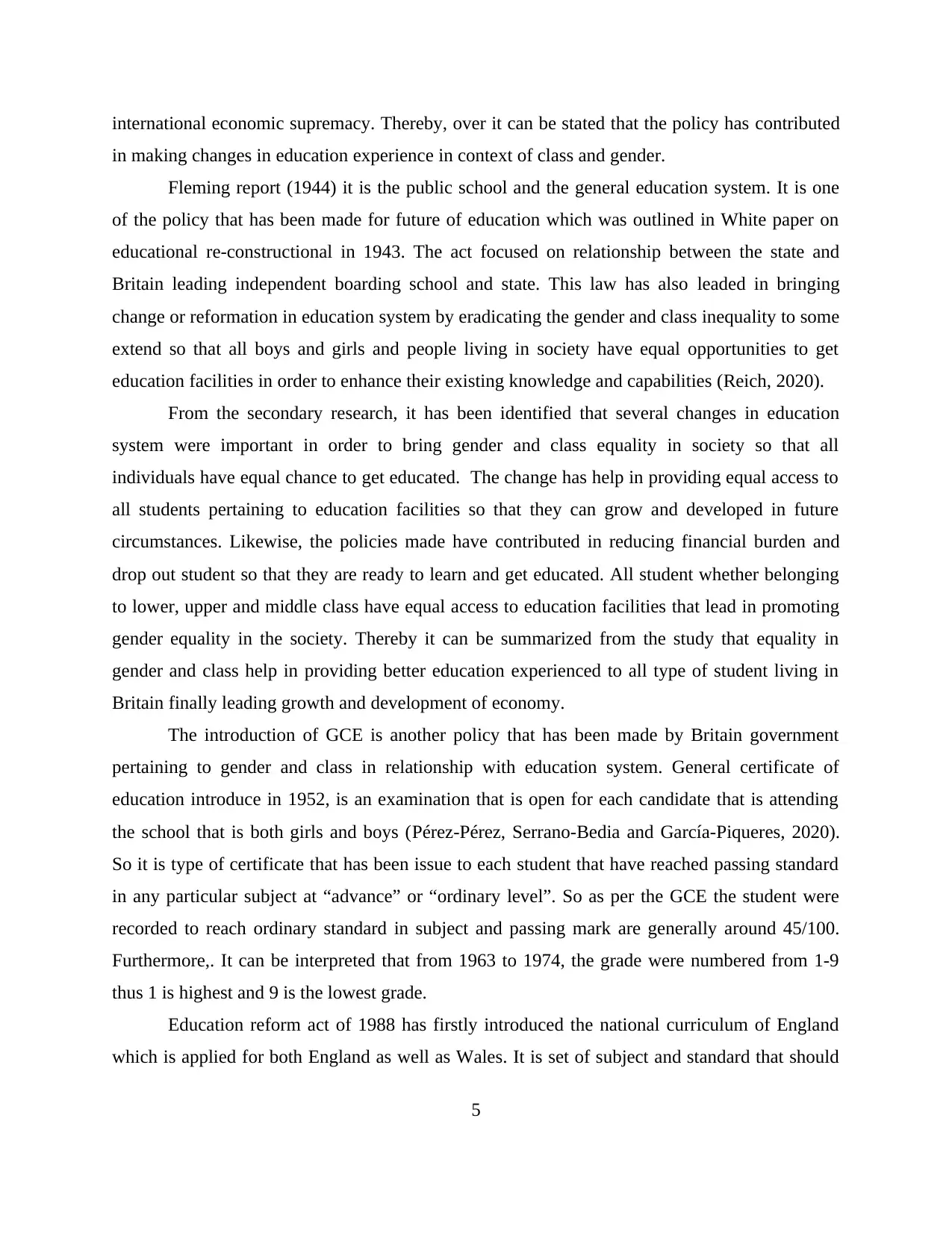
international economic supremacy. Thereby, over it can be stated that the policy has contributed
in making changes in education experience in context of class and gender.
Fleming report (1944) it is the public school and the general education system. It is one
of the policy that has been made for future of education which was outlined in White paper on
educational re-constructional in 1943. The act focused on relationship between the state and
Britain leading independent boarding school and state. This law has also leaded in bringing
change or reformation in education system by eradicating the gender and class inequality to some
extend so that all boys and girls and people living in society have equal opportunities to get
education facilities in order to enhance their existing knowledge and capabilities (Reich, 2020).
From the secondary research, it has been identified that several changes in education
system were important in order to bring gender and class equality in society so that all
individuals have equal chance to get educated. The change has help in providing equal access to
all students pertaining to education facilities so that they can grow and developed in future
circumstances. Likewise, the policies made have contributed in reducing financial burden and
drop out student so that they are ready to learn and get educated. All student whether belonging
to lower, upper and middle class have equal access to education facilities that lead in promoting
gender equality in the society. Thereby it can be summarized from the study that equality in
gender and class help in providing better education experienced to all type of student living in
Britain finally leading growth and development of economy.
The introduction of GCE is another policy that has been made by Britain government
pertaining to gender and class in relationship with education system. General certificate of
education introduce in 1952, is an examination that is open for each candidate that is attending
the school that is both girls and boys (Pérez-Pérez, Serrano-Bedia and García-Piqueres, 2020).
So it is type of certificate that has been issue to each student that have reached passing standard
in any particular subject at “advance” or “ordinary level”. So as per the GCE the student were
recorded to reach ordinary standard in subject and passing mark are generally around 45/100.
Furthermore,. It can be interpreted that from 1963 to 1974, the grade were numbered from 1-9
thus 1 is highest and 9 is the lowest grade.
Education reform act of 1988 has firstly introduced the national curriculum of England
which is applied for both England as well as Wales. It is set of subject and standard that should
5
in making changes in education experience in context of class and gender.
Fleming report (1944) it is the public school and the general education system. It is one
of the policy that has been made for future of education which was outlined in White paper on
educational re-constructional in 1943. The act focused on relationship between the state and
Britain leading independent boarding school and state. This law has also leaded in bringing
change or reformation in education system by eradicating the gender and class inequality to some
extend so that all boys and girls and people living in society have equal opportunities to get
education facilities in order to enhance their existing knowledge and capabilities (Reich, 2020).
From the secondary research, it has been identified that several changes in education
system were important in order to bring gender and class equality in society so that all
individuals have equal chance to get educated. The change has help in providing equal access to
all students pertaining to education facilities so that they can grow and developed in future
circumstances. Likewise, the policies made have contributed in reducing financial burden and
drop out student so that they are ready to learn and get educated. All student whether belonging
to lower, upper and middle class have equal access to education facilities that lead in promoting
gender equality in the society. Thereby it can be summarized from the study that equality in
gender and class help in providing better education experienced to all type of student living in
Britain finally leading growth and development of economy.
The introduction of GCE is another policy that has been made by Britain government
pertaining to gender and class in relationship with education system. General certificate of
education introduce in 1952, is an examination that is open for each candidate that is attending
the school that is both girls and boys (Pérez-Pérez, Serrano-Bedia and García-Piqueres, 2020).
So it is type of certificate that has been issue to each student that have reached passing standard
in any particular subject at “advance” or “ordinary level”. So as per the GCE the student were
recorded to reach ordinary standard in subject and passing mark are generally around 45/100.
Furthermore,. It can be interpreted that from 1963 to 1974, the grade were numbered from 1-9
thus 1 is highest and 9 is the lowest grade.
Education reform act of 1988 has firstly introduced the national curriculum of England
which is applied for both England as well as Wales. It is set of subject and standard that should
5
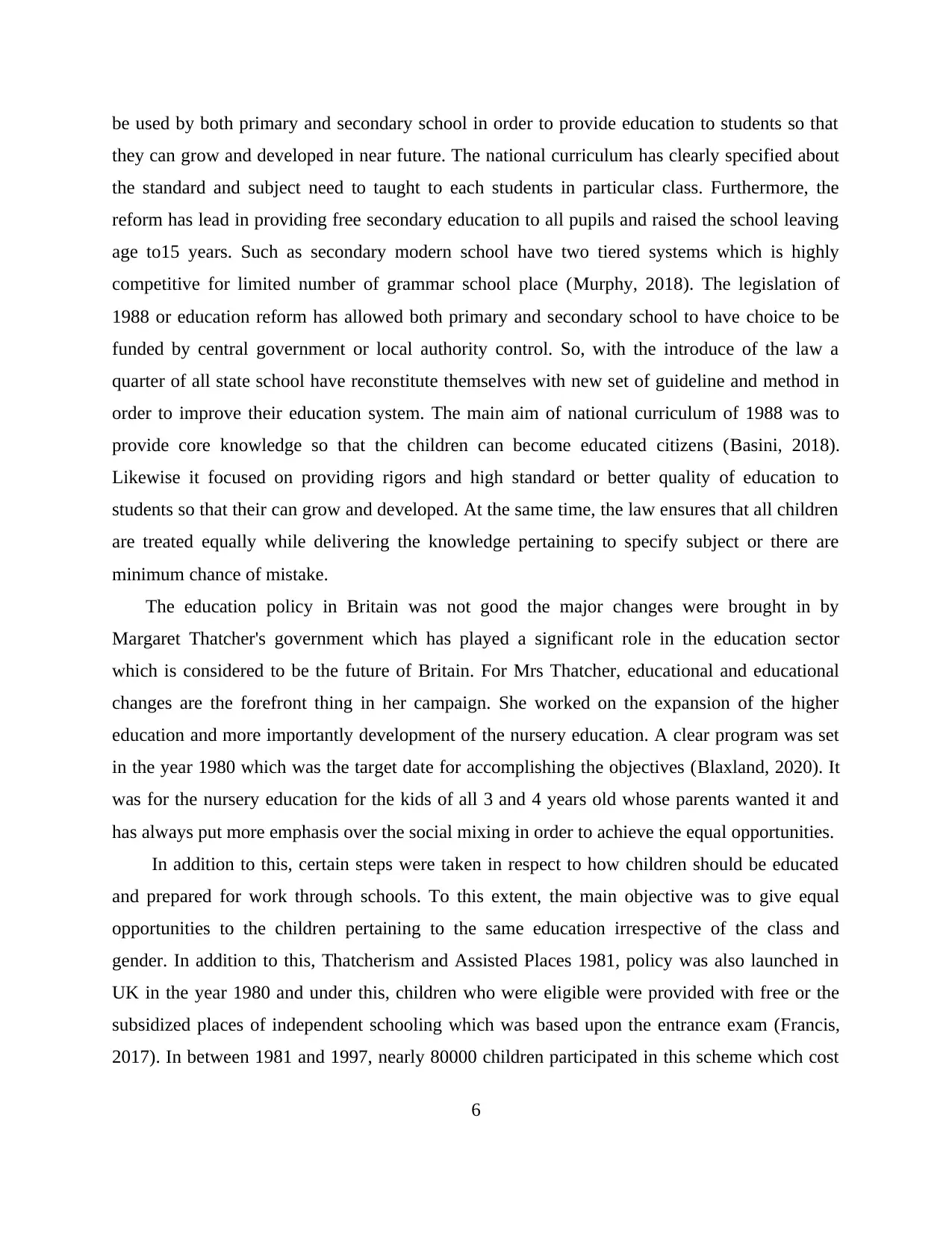
be used by both primary and secondary school in order to provide education to students so that
they can grow and developed in near future. The national curriculum has clearly specified about
the standard and subject need to taught to each students in particular class. Furthermore, the
reform has lead in providing free secondary education to all pupils and raised the school leaving
age to15 years. Such as secondary modern school have two tiered systems which is highly
competitive for limited number of grammar school place (Murphy, 2018). The legislation of
1988 or education reform has allowed both primary and secondary school to have choice to be
funded by central government or local authority control. So, with the introduce of the law a
quarter of all state school have reconstitute themselves with new set of guideline and method in
order to improve their education system. The main aim of national curriculum of 1988 was to
provide core knowledge so that the children can become educated citizens (Basini, 2018).
Likewise it focused on providing rigors and high standard or better quality of education to
students so that their can grow and developed. At the same time, the law ensures that all children
are treated equally while delivering the knowledge pertaining to specify subject or there are
minimum chance of mistake.
The education policy in Britain was not good the major changes were brought in by
Margaret Thatcher's government which has played a significant role in the education sector
which is considered to be the future of Britain. For Mrs Thatcher, educational and educational
changes are the forefront thing in her campaign. She worked on the expansion of the higher
education and more importantly development of the nursery education. A clear program was set
in the year 1980 which was the target date for accomplishing the objectives (Blaxland, 2020). It
was for the nursery education for the kids of all 3 and 4 years old whose parents wanted it and
has always put more emphasis over the social mixing in order to achieve the equal opportunities.
In addition to this, certain steps were taken in respect to how children should be educated
and prepared for work through schools. To this extent, the main objective was to give equal
opportunities to the children pertaining to the same education irrespective of the class and
gender. In addition to this, Thatcherism and Assisted Places 1981, policy was also launched in
UK in the year 1980 and under this, children who were eligible were provided with free or the
subsidized places of independent schooling which was based upon the entrance exam (Francis,
2017). In between 1981 and 1997, nearly 80000 children participated in this scheme which cost
6
they can grow and developed in near future. The national curriculum has clearly specified about
the standard and subject need to taught to each students in particular class. Furthermore, the
reform has lead in providing free secondary education to all pupils and raised the school leaving
age to15 years. Such as secondary modern school have two tiered systems which is highly
competitive for limited number of grammar school place (Murphy, 2018). The legislation of
1988 or education reform has allowed both primary and secondary school to have choice to be
funded by central government or local authority control. So, with the introduce of the law a
quarter of all state school have reconstitute themselves with new set of guideline and method in
order to improve their education system. The main aim of national curriculum of 1988 was to
provide core knowledge so that the children can become educated citizens (Basini, 2018).
Likewise it focused on providing rigors and high standard or better quality of education to
students so that their can grow and developed. At the same time, the law ensures that all children
are treated equally while delivering the knowledge pertaining to specify subject or there are
minimum chance of mistake.
The education policy in Britain was not good the major changes were brought in by
Margaret Thatcher's government which has played a significant role in the education sector
which is considered to be the future of Britain. For Mrs Thatcher, educational and educational
changes are the forefront thing in her campaign. She worked on the expansion of the higher
education and more importantly development of the nursery education. A clear program was set
in the year 1980 which was the target date for accomplishing the objectives (Blaxland, 2020). It
was for the nursery education for the kids of all 3 and 4 years old whose parents wanted it and
has always put more emphasis over the social mixing in order to achieve the equal opportunities.
In addition to this, certain steps were taken in respect to how children should be educated
and prepared for work through schools. To this extent, the main objective was to give equal
opportunities to the children pertaining to the same education irrespective of the class and
gender. In addition to this, Thatcherism and Assisted Places 1981, policy was also launched in
UK in the year 1980 and under this, children who were eligible were provided with free or the
subsidized places of independent schooling which was based upon the entrance exam (Francis,
2017). In between 1981 and 1997, nearly 80000 children participated in this scheme which cost
6
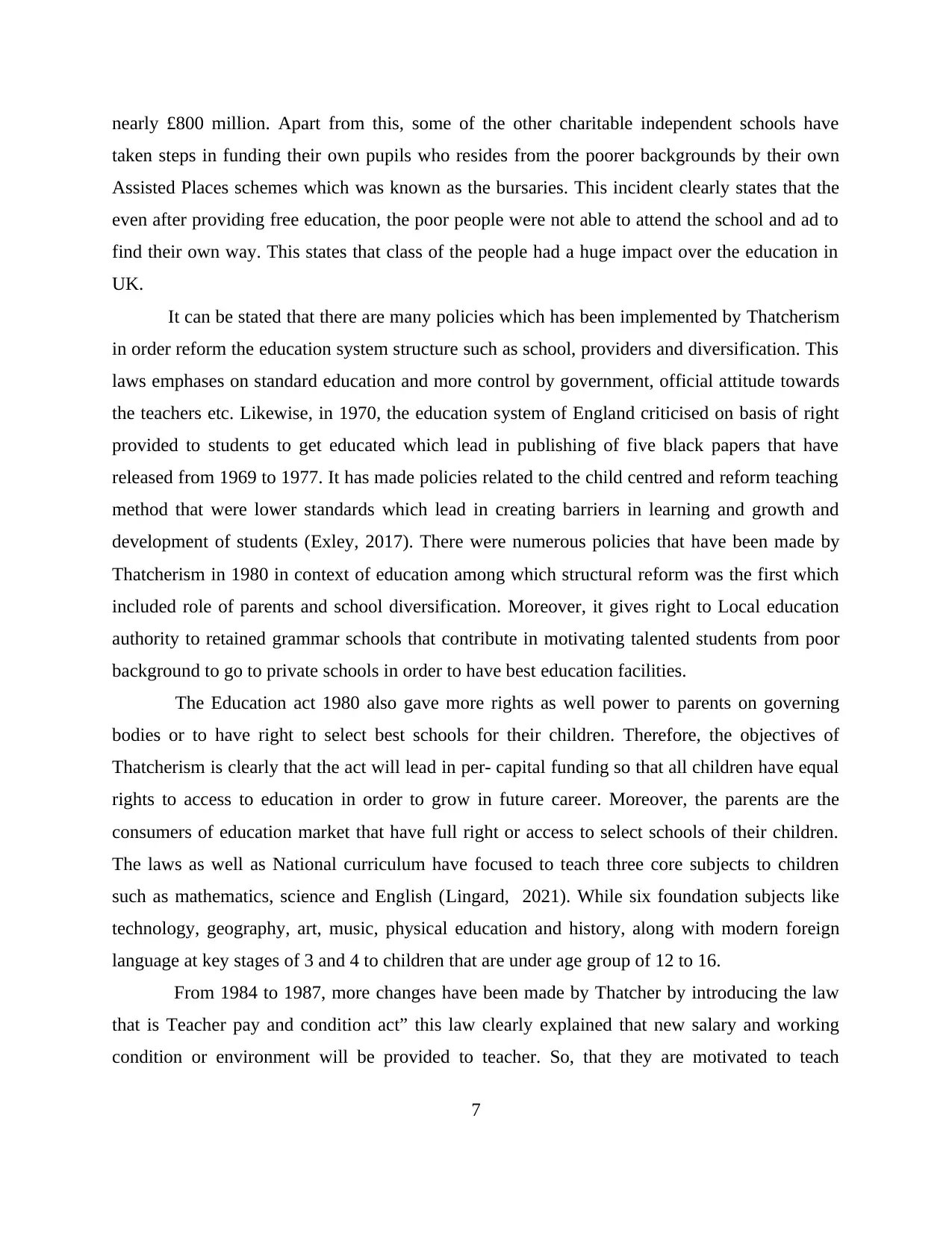
nearly £800 million. Apart from this, some of the other charitable independent schools have
taken steps in funding their own pupils who resides from the poorer backgrounds by their own
Assisted Places schemes which was known as the bursaries. This incident clearly states that the
even after providing free education, the poor people were not able to attend the school and ad to
find their own way. This states that class of the people had a huge impact over the education in
UK.
It can be stated that there are many policies which has been implemented by Thatcherism
in order reform the education system structure such as school, providers and diversification. This
laws emphases on standard education and more control by government, official attitude towards
the teachers etc. Likewise, in 1970, the education system of England criticised on basis of right
provided to students to get educated which lead in publishing of five black papers that have
released from 1969 to 1977. It has made policies related to the child centred and reform teaching
method that were lower standards which lead in creating barriers in learning and growth and
development of students (Exley, 2017). There were numerous policies that have been made by
Thatcherism in 1980 in context of education among which structural reform was the first which
included role of parents and school diversification. Moreover, it gives right to Local education
authority to retained grammar schools that contribute in motivating talented students from poor
background to go to private schools in order to have best education facilities.
The Education act 1980 also gave more rights as well power to parents on governing
bodies or to have right to select best schools for their children. Therefore, the objectives of
Thatcherism is clearly that the act will lead in per- capital funding so that all children have equal
rights to access to education in order to grow in future career. Moreover, the parents are the
consumers of education market that have full right or access to select schools of their children.
The laws as well as National curriculum have focused to teach three core subjects to children
such as mathematics, science and English (Lingard, 2021). While six foundation subjects like
technology, geography, art, music, physical education and history, along with modern foreign
language at key stages of 3 and 4 to children that are under age group of 12 to 16.
From 1984 to 1987, more changes have been made by Thatcher by introducing the law
that is Teacher pay and condition act” this law clearly explained that new salary and working
condition or environment will be provided to teacher. So, that they are motivated to teach
7
taken steps in funding their own pupils who resides from the poorer backgrounds by their own
Assisted Places schemes which was known as the bursaries. This incident clearly states that the
even after providing free education, the poor people were not able to attend the school and ad to
find their own way. This states that class of the people had a huge impact over the education in
UK.
It can be stated that there are many policies which has been implemented by Thatcherism
in order reform the education system structure such as school, providers and diversification. This
laws emphases on standard education and more control by government, official attitude towards
the teachers etc. Likewise, in 1970, the education system of England criticised on basis of right
provided to students to get educated which lead in publishing of five black papers that have
released from 1969 to 1977. It has made policies related to the child centred and reform teaching
method that were lower standards which lead in creating barriers in learning and growth and
development of students (Exley, 2017). There were numerous policies that have been made by
Thatcherism in 1980 in context of education among which structural reform was the first which
included role of parents and school diversification. Moreover, it gives right to Local education
authority to retained grammar schools that contribute in motivating talented students from poor
background to go to private schools in order to have best education facilities.
The Education act 1980 also gave more rights as well power to parents on governing
bodies or to have right to select best schools for their children. Therefore, the objectives of
Thatcherism is clearly that the act will lead in per- capital funding so that all children have equal
rights to access to education in order to grow in future career. Moreover, the parents are the
consumers of education market that have full right or access to select schools of their children.
The laws as well as National curriculum have focused to teach three core subjects to children
such as mathematics, science and English (Lingard, 2021). While six foundation subjects like
technology, geography, art, music, physical education and history, along with modern foreign
language at key stages of 3 and 4 to children that are under age group of 12 to 16.
From 1984 to 1987, more changes have been made by Thatcher by introducing the law
that is Teacher pay and condition act” this law clearly explained that new salary and working
condition or environment will be provided to teacher. So, that they are motivated to teach
7
Paraphrase This Document
Need a fresh take? Get an instant paraphrase of this document with our AI Paraphraser
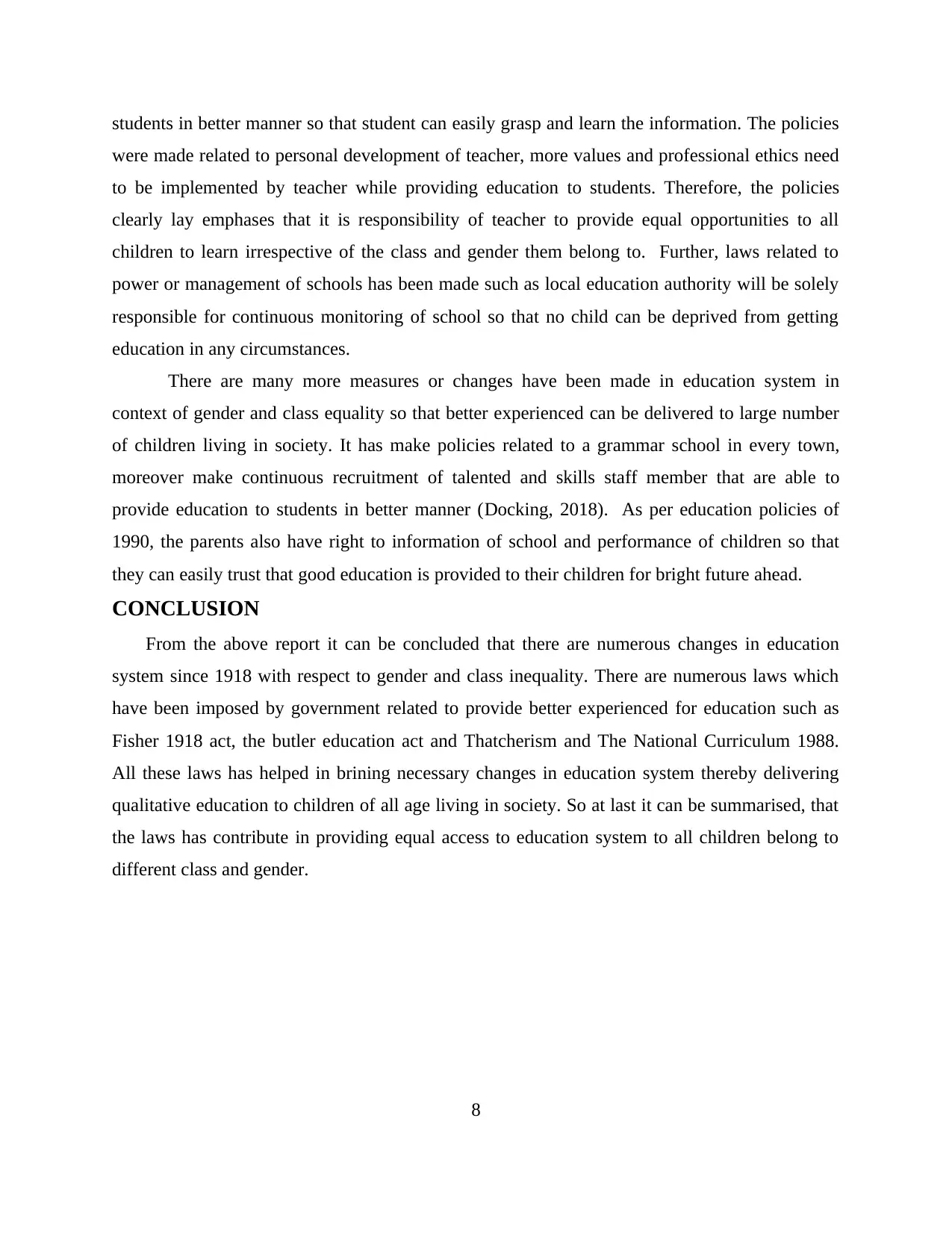
students in better manner so that student can easily grasp and learn the information. The policies
were made related to personal development of teacher, more values and professional ethics need
to be implemented by teacher while providing education to students. Therefore, the policies
clearly lay emphases that it is responsibility of teacher to provide equal opportunities to all
children to learn irrespective of the class and gender them belong to. Further, laws related to
power or management of schools has been made such as local education authority will be solely
responsible for continuous monitoring of school so that no child can be deprived from getting
education in any circumstances.
There are many more measures or changes have been made in education system in
context of gender and class equality so that better experienced can be delivered to large number
of children living in society. It has make policies related to a grammar school in every town,
moreover make continuous recruitment of talented and skills staff member that are able to
provide education to students in better manner (Docking, 2018). As per education policies of
1990, the parents also have right to information of school and performance of children so that
they can easily trust that good education is provided to their children for bright future ahead.
CONCLUSION
From the above report it can be concluded that there are numerous changes in education
system since 1918 with respect to gender and class inequality. There are numerous laws which
have been imposed by government related to provide better experienced for education such as
Fisher 1918 act, the butler education act and Thatcherism and The National Curriculum 1988.
All these laws has helped in brining necessary changes in education system thereby delivering
qualitative education to children of all age living in society. So at last it can be summarised, that
the laws has contribute in providing equal access to education system to all children belong to
different class and gender.
8
were made related to personal development of teacher, more values and professional ethics need
to be implemented by teacher while providing education to students. Therefore, the policies
clearly lay emphases that it is responsibility of teacher to provide equal opportunities to all
children to learn irrespective of the class and gender them belong to. Further, laws related to
power or management of schools has been made such as local education authority will be solely
responsible for continuous monitoring of school so that no child can be deprived from getting
education in any circumstances.
There are many more measures or changes have been made in education system in
context of gender and class equality so that better experienced can be delivered to large number
of children living in society. It has make policies related to a grammar school in every town,
moreover make continuous recruitment of talented and skills staff member that are able to
provide education to students in better manner (Docking, 2018). As per education policies of
1990, the parents also have right to information of school and performance of children so that
they can easily trust that good education is provided to their children for bright future ahead.
CONCLUSION
From the above report it can be concluded that there are numerous changes in education
system since 1918 with respect to gender and class inequality. There are numerous laws which
have been imposed by government related to provide better experienced for education such as
Fisher 1918 act, the butler education act and Thatcherism and The National Curriculum 1988.
All these laws has helped in brining necessary changes in education system thereby delivering
qualitative education to children of all age living in society. So at last it can be summarised, that
the laws has contribute in providing equal access to education system to all children belong to
different class and gender.
8
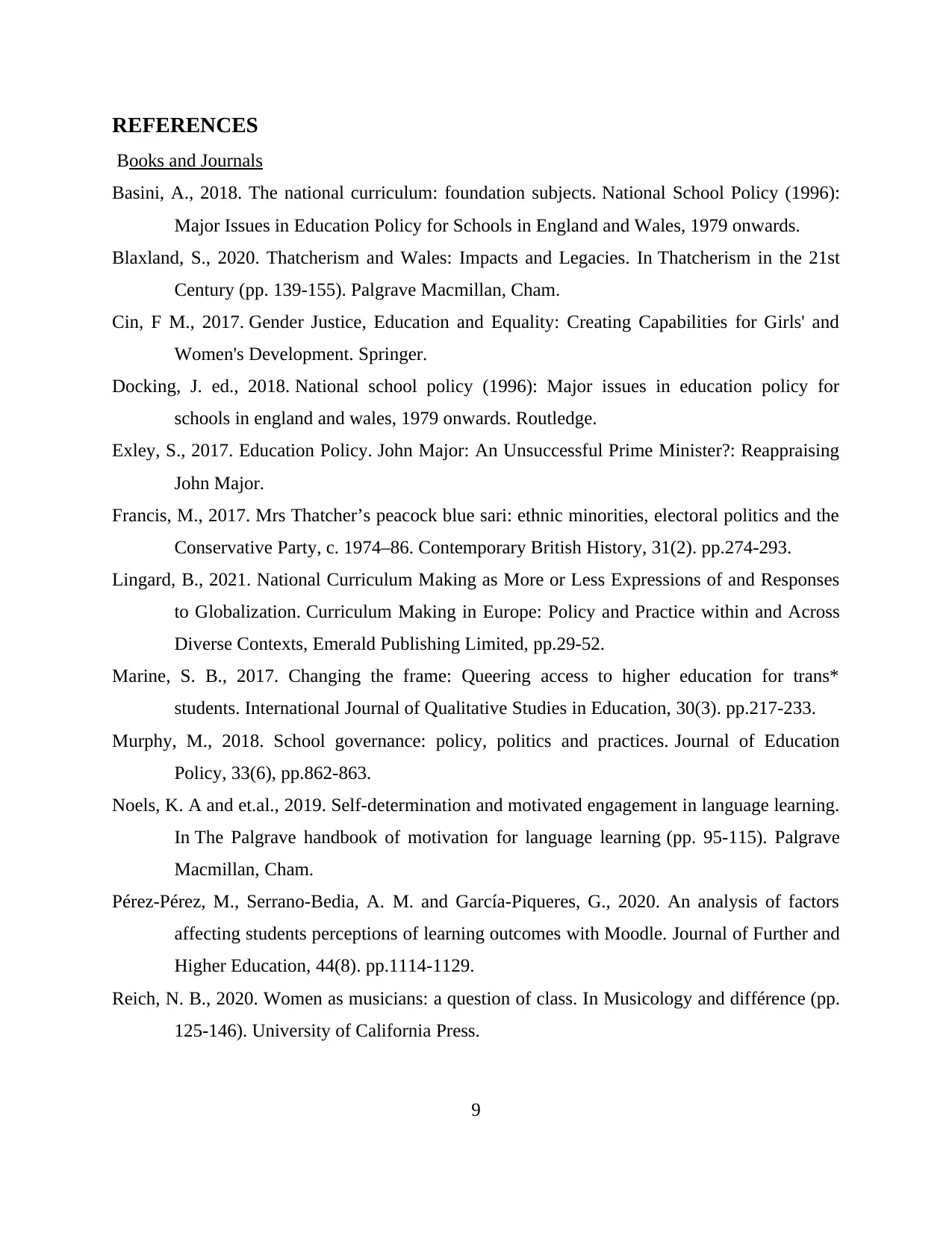
REFERENCES
Books and Journals
Basini, A., 2018. The national curriculum: foundation subjects. National School Policy (1996):
Major Issues in Education Policy for Schools in England and Wales, 1979 onwards.
Blaxland, S., 2020. Thatcherism and Wales: Impacts and Legacies. In Thatcherism in the 21st
Century (pp. 139-155). Palgrave Macmillan, Cham.
Cin, F M., 2017. Gender Justice, Education and Equality: Creating Capabilities for Girls' and
Women's Development. Springer.
Docking, J. ed., 2018. National school policy (1996): Major issues in education policy for
schools in england and wales, 1979 onwards. Routledge.
Exley, S., 2017. Education Policy. John Major: An Unsuccessful Prime Minister?: Reappraising
John Major.
Francis, M., 2017. Mrs Thatcher’s peacock blue sari: ethnic minorities, electoral politics and the
Conservative Party, c. 1974–86. Contemporary British History, 31(2). pp.274-293.
Lingard, B., 2021. National Curriculum Making as More or Less Expressions of and Responses
to Globalization. Curriculum Making in Europe: Policy and Practice within and Across
Diverse Contexts, Emerald Publishing Limited, pp.29-52.
Marine, S. B., 2017. Changing the frame: Queering access to higher education for trans*
students. International Journal of Qualitative Studies in Education, 30(3). pp.217-233.
Murphy, M., 2018. School governance: policy, politics and practices. Journal of Education
Policy, 33(6), pp.862-863.
Noels, K. A and et.al., 2019. Self-determination and motivated engagement in language learning.
In The Palgrave handbook of motivation for language learning (pp. 95-115). Palgrave
Macmillan, Cham.
Pérez-Pérez, M., Serrano-Bedia, A. M. and García-Piqueres, G., 2020. An analysis of factors
affecting students perceptions of learning outcomes with Moodle. Journal of Further and
Higher Education, 44(8). pp.1114-1129.
Reich, N. B., 2020. Women as musicians: a question of class. In Musicology and différence (pp.
125-146). University of California Press.
9
Books and Journals
Basini, A., 2018. The national curriculum: foundation subjects. National School Policy (1996):
Major Issues in Education Policy for Schools in England and Wales, 1979 onwards.
Blaxland, S., 2020. Thatcherism and Wales: Impacts and Legacies. In Thatcherism in the 21st
Century (pp. 139-155). Palgrave Macmillan, Cham.
Cin, F M., 2017. Gender Justice, Education and Equality: Creating Capabilities for Girls' and
Women's Development. Springer.
Docking, J. ed., 2018. National school policy (1996): Major issues in education policy for
schools in england and wales, 1979 onwards. Routledge.
Exley, S., 2017. Education Policy. John Major: An Unsuccessful Prime Minister?: Reappraising
John Major.
Francis, M., 2017. Mrs Thatcher’s peacock blue sari: ethnic minorities, electoral politics and the
Conservative Party, c. 1974–86. Contemporary British History, 31(2). pp.274-293.
Lingard, B., 2021. National Curriculum Making as More or Less Expressions of and Responses
to Globalization. Curriculum Making in Europe: Policy and Practice within and Across
Diverse Contexts, Emerald Publishing Limited, pp.29-52.
Marine, S. B., 2017. Changing the frame: Queering access to higher education for trans*
students. International Journal of Qualitative Studies in Education, 30(3). pp.217-233.
Murphy, M., 2018. School governance: policy, politics and practices. Journal of Education
Policy, 33(6), pp.862-863.
Noels, K. A and et.al., 2019. Self-determination and motivated engagement in language learning.
In The Palgrave handbook of motivation for language learning (pp. 95-115). Palgrave
Macmillan, Cham.
Pérez-Pérez, M., Serrano-Bedia, A. M. and García-Piqueres, G., 2020. An analysis of factors
affecting students perceptions of learning outcomes with Moodle. Journal of Further and
Higher Education, 44(8). pp.1114-1129.
Reich, N. B., 2020. Women as musicians: a question of class. In Musicology and différence (pp.
125-146). University of California Press.
9
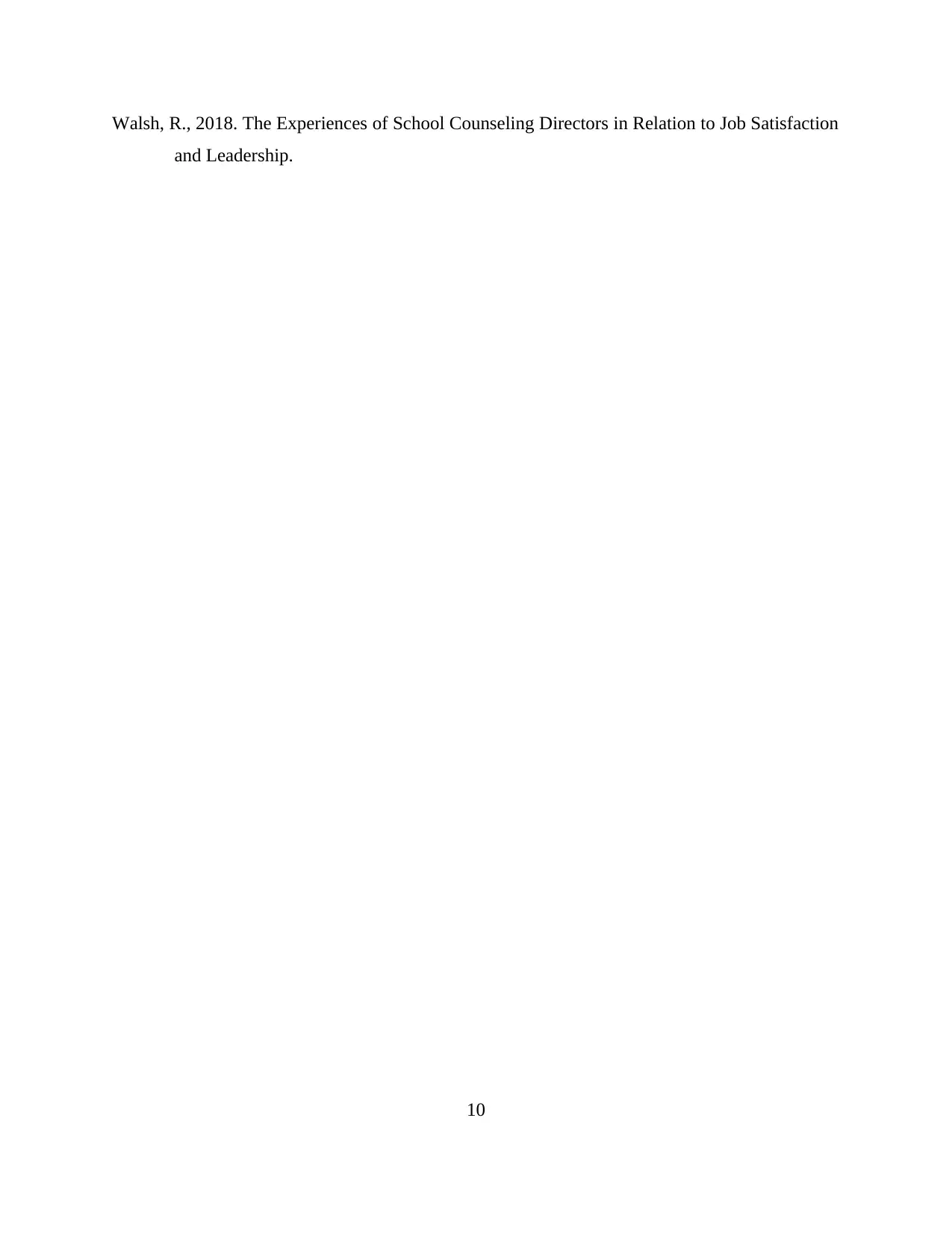
Walsh, R., 2018. The Experiences of School Counseling Directors in Relation to Job Satisfaction
and Leadership.
10
and Leadership.
10
1 out of 10
Related Documents
Your All-in-One AI-Powered Toolkit for Academic Success.
+13062052269
info@desklib.com
Available 24*7 on WhatsApp / Email
![[object Object]](/_next/static/media/star-bottom.7253800d.svg)
Unlock your academic potential
© 2024 | Zucol Services PVT LTD | All rights reserved.





